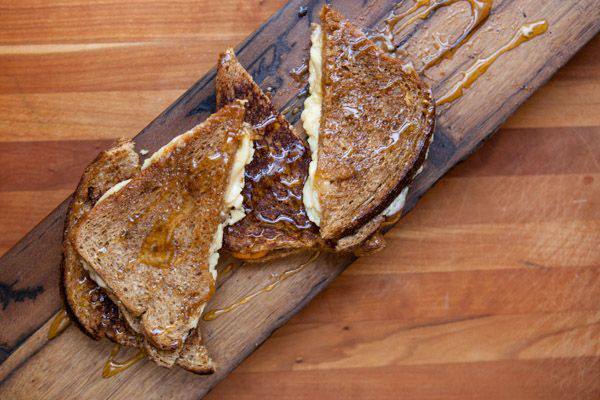

The first-ever food truck for social change will be serving up items like grilled cheese sandwiches drizzled with maple syrup around Manhattan and Brooklyn starting in November. Photo: Drive Change
We love food trucks because they promise a delicious break from the monotony of another sad desk lunch. Jordyn Lexton looked at our city’s mobile meal options and saw vehicles for social empowerment, so she started Drive Change, a business that builds and designs food trucks to hire and train formerly incarcerated youth offenders in the culinary arts.
Lexton’s three years teaching at East River Academy, a public school at Rikers Island, inspired Drive Change, which she founded and runs with Annie Bickerton, its development director. In New York State, defendants as young as 16 years old can be tried as adults, and many of her students were young offenders dealing with life in an adult prison, rife with, as Bickerton puts it, “insurmountable barriers.” Lexton and Bickerton aim to use food as way to provide the stable jobs that Lexton’s former students need to break the cycle of recidivism–according to the New York State Office of Children and Family Services 66% of youth offenders return to prison within a year of release.
The eight-month program is split into three phases, and participants will be paid an average of $10 an hour while enrolled. First, students train for the licenses required to work with food. Then they start shifts on food trucks, supplemented by classes in culinary arts, social media and marketing. In the final phase, they work with educators to develop a job search strategy and ultimately, a job in the culinary arts, or further education in another field, if they prefer. Lexton and Bickerton plan to add a new truck every year, with the goal of serving 150 youth a year by 2018.
The goal is to employ everyone who applies and significantly lower the recidivism rate. An Indiegogo campaign raised $42,000 in start-up funds, and as Bickerton points out, Drive Change already has strong relationships with existing re-entry programs, and with the New York Food Truck Association, whose members have pledged to hire participants who have completed the Drive Change program. They’re limiting the pilot-program to four people, and working with other agencies to provide mentoring and counseling services until they hire their own social workers, while Drive Change provides the job training. Lexton even spent seven months working on one of Kimchi Taco’s trucks, learning the ins and outs of managing a mobile food stand.
The first truck, Snow Day (@snowdaytruck), assembled by Shanghai Steel and designed by Brooklyn-based Situ Studio, is set to launch the first week of November, with stops in Manhattan and Brooklyn–you can track the truck’s location on Twitter: @DriveChangeNYC. Bickerton describes it as “a modern sugar shack concept,” based on the treats popular during sugaring season in New England. The mouth-watering menu includes maple bacon donuts, maple syrup poured over fresh snow and maple grilled cheese sandwiches. Bickerton and Lexton were adamant that the food be as delicious as the concept is altruistic–social justice has never tasted so good.


Thanks so much for this wonderful article! We can’t wait to be up and running next month. – Annie Bickerton, Drive Change http://www.drivechangenyc.org